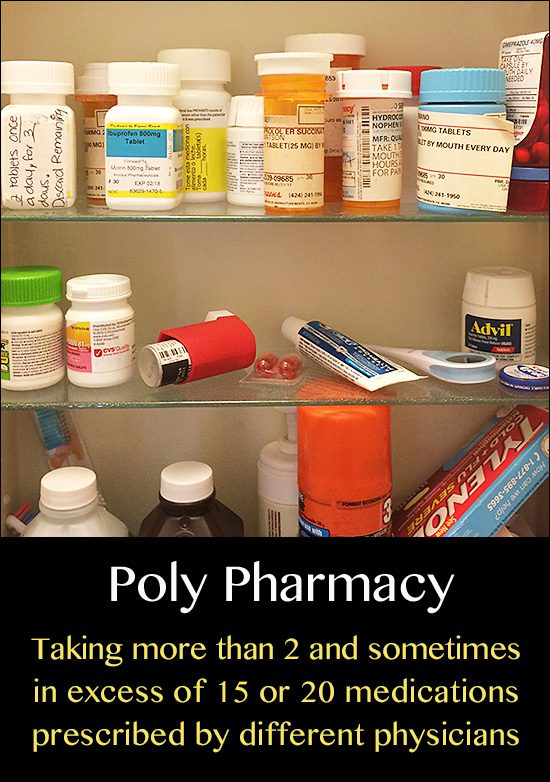Some medical experts are worried that along with the epidemic of opioid addiction, America is facing another, less publicized healthcare crisis in the nation’s aging baby-boomer population – Polypharmacy.

Most common among senior citizens, polypharmacy is the practice of a person taking more than two sometimes in excess of 15 or 20 medications that might be unnecessary and prescribed by different physicians.
Polypharmacy should not be confused with poly-drug use, also called polysubstance abuse, which is a completely different form of drug misuse. Taking three or more drugs, without a particular affinity to any one of them, but just as a means of getting high, is considered polysubstance abuse, and is most often associated with teenagers and young adults.
Regarding polypharmacy misuse, researchers in 2015 found that 25 percent of seniors between the ages of 65 and 69 take at least five prescription drugs for chronic conditions, and the number of prescribed medications increases, as people get older.
For those aged 70 to 79, the number jumps to nearly half, 46 percent of all seniors on more than five medications.
“Contemporary, older adults on multiple medications have a worse health status compared to those on fewer medications, and appear to be a vulnerable population,” researchers concluded.
As the U.S. population continues to age, polypharmacy will become an increasingly crucial issue.”
Senior Citizens and Prescription Medications
Much of the research and statistics about how seniors are prescribed and take their medications is disturbing, to say the least. These include some of the following:
- The side of effect one or more drugs is often perceived as a new medical issue rather a reaction to a new prescription and this often leads to what’s known as a prescribing cascade
- Elderly patients don’t metabolize medications as easily and are more prone to suffer dizziness, confusion and falls and studies have shown that polypharmacy can lead to premature, unnecessary deaths
- The percentage of seniors 65 or older taking psychiatric medications more than doubled from 2004 to 2013 and nearly half the population taking anti-psychotic drugs had no mental health diagnoses, according to data compiled at the University of Michigan
Polypharmacy Dependence and Addiction
Another dangerous side effect of taking too many medications is polypharmacy dependence, which can manifest in a number of ways, including a full addiction to certain medications such as opioid painkillers.
Other prescriptions like benzodiazepines can be dangerous if they aren’t tapered off properly under the guidance of a physician. Some medications might not cause any health problems if the patient stops taking them on their own, but there may be some unpleasant side effects or an adjustment period as the body re-regulates itself.
Barbara Farrell, a pharmacist in Canada and a clinical scientist at Bruyere Research Institute, told Kaiser Health Network why patients might be wary of getting off some of their meds:
“They may say, ‘I tried stopping my sleeping pill and I couldn’t sleep the next night, so I figured I needed it.’ Nobody explained to them that rebound insomnia, which can occur after stopping sleeping pills, lasts three to five days.”
There is a small but growing movement that’s adopted the approach of deprescribing seniors from medications that might be unnecessary or redundant.
At Georgetown University, Ranit Mishori, a professor of family medicine at Georgetown University, tells Kaiser that it takes physicians time to educate themselves about taking patients off medications rather than prescribing them more.
“That is what we’re taught as physicians: to prescribe drugs,” she says. “We’re definitely not taught how to take people off meds.”
Related:
Baby Boomers and Senior Substance Abuse Addiction
Are Senior Citizens Drinking Too Much?
What Are Common Off-Label Prescription Drugs?
10 Ways to Treat Pain Without Opioids or Prescription Painkillers





